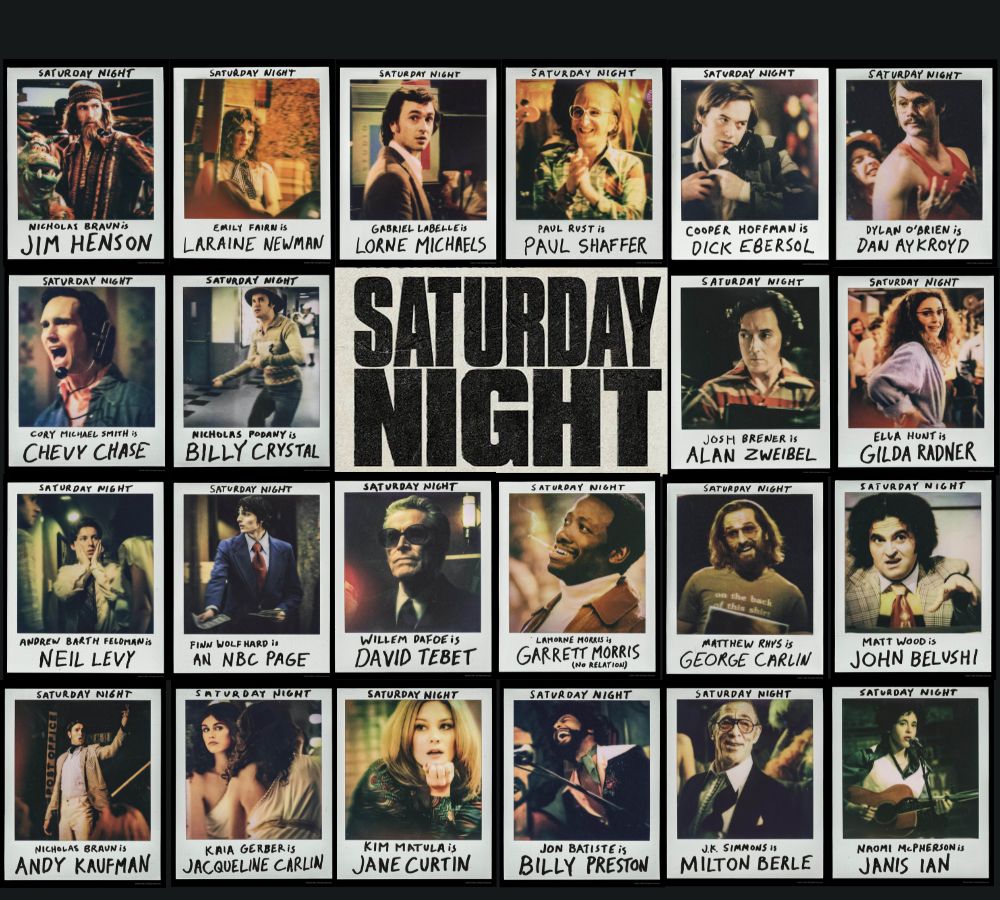Since 1975, Americans have sat in front of their TVs every Saturday night at 11:30 p.m., flipped to Channel 4 and complained that “Saturday Night Live” isn’t funny anymore. They do it again the next week, and every week after that.
50 years of tune-ins later, “SNL” is still a fixture of American pop culture, whether you like it or not. Through diner lobsters, Lonely Island shorts and Weekend Update joke swaps, NBC’s late-night sketch comedy show manages to churn out a snapshot of current events and trends every week. If you’ve watched even one of its nearly 1,000 episodes, you’ve probably wondered how the show comes together in time for someone to read “Live from New York!” off a cue card before the clock strikes 12.
In Jason Reitman’s new film “Saturday Night,” it’s 10 p.m. on Oct. 11, 1975, and the cast and crew are wondering the same thing. While the film is loosely based on James Andrew Miller and Tom Shales’ book “Live From New York: The Complete, Uncensored History of Saturday Night Live as Told by Its Stars, Writers, and Guests” and collections of interviews with the 1974 staff, Reitman’s film feels just like watching a sketch on the big screen — one where the writers played telephone to conjure up vignettes for the most chaotic premiere possible.
At the center of the whirlwind production is creator and producer Lorne Michaels (Gabriel LaBelle), who manages to sell the network on “NBC’s Saturday Night” as a contemporary program for the TV generation. Michaels ropes in Director of Weekend Late Night Programming Dick Ebersol (Cooper Hoffman), tens of whiskey-shooting studio executives who aren’t fully in on the joke, a cast, crew and a llama to a vision he can’t even explain. In just 90 minutes, Michaels has to pull this team together and get “Saturday Night” ready for air before the control room hits play on a rerun tape of “The Tonight Show Starring Johnny Carson.”
Like “SNL” itself, “Saturday Night” gets its energy from its zany and captivating ensemble. Reitman’s cast steals the show with performances that not only celebrate the “Not Ready for Prime Time Players,” but embody them. Cory Michael Smith captures the arrogance of comedic genius Chevy Chase, who’s one foot out the door for “The Tonight Show” before “Saturday Night” even makes it to air. His sharpness and sarcasm are electric at the “Weekend Update” desk, nearly indistinguishable from the real thing — outside of real-life Chase’s racist past. John Belushi (Matt Wood) is hilarious when on a rampage through “30 Rock” in his iconic bee suit, refusing to sign his contract.
The crew members are equally integral to the film’s vivacity. Head writer Michael O’Donoghue (Tommy Dewey) literally and figuratively ignites the dialogue with his quick wit — and by setting a script on fire. He’s spirited when egging on the cast to chant “I am Satan” at the churchgoing executive responsible for providing script notes. Writer Rosie Shuster (Rachel Sennott) stabilizes the frenetic cast and her then-husband Michaels with her even temper and compassion, eager to run a clothing rack or remind the team what they’re doing in the first place.
While the plot and pacing of “Saturday Night” seems as allegedly high as the 1975 staff, the film finds longer beats throughout to comment on the state of the ’70s entertainment industry. While everyone’s buzzing and rushing to rehearse the show, Garrett Morris (Lamorne Morris) is found ruminating on his role as a former theater actor and playwright, but also as the first Black cast member. Jane Curtin (Kim Matula) expresses disdain for her typecast on the show, always playing the mom type because of her age. And executives David Tebet (Willem Dafoe) and Milton Berle (J.K. Simmons) get under the cast and crews’ skin with their blank stares after a punchline, somehow widening the already significant generational gap between the big heads and those within Studio 8H.
“SNL” may feel out-of-touch for skeptical viewers half a century later, but “Saturday Night” embraces the age-driven conflict, grounding itself in the younger generation’s constant struggle to create art that relates to them and the world they inhabit. Michaels may drive everyone up a wall throughout the film with his index card schedule that’s thrice the allotted airtime and his utter inability to kiss ass to the superiors greenlighting his show, but there’s something enthralling about his blind faith in the network, his cast and himself. He genuinely believes he’s giving a voice to young people everywhere, creating something that’s bigger than himself. And lost in Michaels’ idealism, you can’t help but buy it, too. It’s easy to forget that you know the ending to “Saturday Night” 50 years later — you’re also in those crowded elevators and hazy writer’s rooms, wondering how you’re going to cut down all those musical performances and keep to one stand-up set.
“Saturday Night” will be a nostalgic watch for longtime “SNL” fanatics, but it’s arguably more suited for the future harbingers of entertainment media — the current Michaels’ of the world who, too, dream of a space on screen. One day, they’ll occupy writer’s rooms, make cue cards or deliver a monologue from the home base set — as long as the suits upstairs at NBC hold off on rerunning Jimmy Fallon on Saturdays a little while longer.
Contact Dani Biondi at [email protected].























































































































































